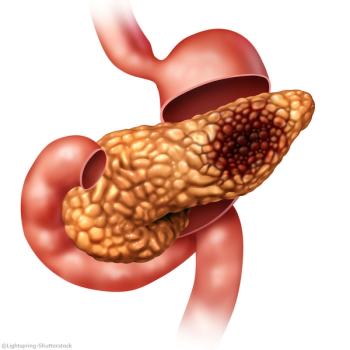
Oncology NEWS International
- Oncology NEWS International Vol 15 No 12
- Volume 15
- Issue 12
Biomarkers Panel Promising for Detecting Pancreatic Ca
A panel of 10 biomarkers found in the blood may prove to be useful in detecting asymptomatic pancreatic cancer, according to researchers at the University of Pittsburgh School of Medicine. "With median survival rates of 6 to 12 months, early detection of pancreatic cancer is crucial to patient survival, but there has been no way to diagnose it early before symptoms occur," Anna E. Lokshin, PhD, associate professor of medicine and pathology, said at the American Association of Cancer Research's Frontiers in Cancer Prevention Research meeting
BOSTONA panel of 10 biomarkers found in the blood may prove to be useful in detecting asymptomatic pancreatic cancer, according to researchers at the University of Pittsburgh School of Medicine. "With median survival rates of 6 to 12 months, early detection of pancreatic cancer is crucial to patient survival, but there has been no way to diagnose it early before symptoms occur," Anna E. Lokshin, PhD, associate professor of medicine and pathology, said at the American Association of Cancer Research's Frontiers in Cancer Prevention Research meeting (abstract PR-04).
Rather than searching for a single protein, such as PSA or CA-125, Dr. Lokshin and her colleagues looked for several proteins produced by near-by tissues in response to the tumor's growth. "Tumors are located in the context of certain tissues, and those tissues react in their own individual ways to the cancer," Dr. Lokshin said. Immune cells, the endothelial-vascular system, and underlying supporting tissue or stroma react to each tumor uniquely. "We have tried to capture the response of local environment to the tumor as well as the tumor's own products in our assay," she said.
Using a novel protein array system (xMAP for Multianalyte Profiling; Luminex Corp., Austin, Texas), which allows for simultaneous quantitation of up to 100 soluble proteins, the investigators evaluated 44 markers, including cytokines, chemokines, adhesion molecules, and hormones, for their ability to distinguish pancreatic patients from controls. Antibodies are used to detect the proteins on the array.
Blood from 100 pancreatic cancer
patients and 400 healthy controls was screened with the immunoassay. The scientists found that patients with pancreatic cancer have significantly different expression patterns of several serum biomarkers, compared with healthy controls. Out of the 44 markers used, Dr. Lokshin said, the 10 with the best diagnostic power included CA-125, a protein marker used to detect ovarian cancer, and CA19-9, which is known to correlate weakly with pancreatic cancer.
Using this panel of 10 markers, the pancreatic cancers were correctly identified 97% of the time, Dr. Lokshin reported. The sensitivity, or the frequency that positive cases were identified, was 95%, and the specificity, or frequency of identifying noncancer, was 98%.
Samples From PLCO Trial
The researchers are continuing to validate the assay, and particularly to test its ability to identify pancreatic cancer at early treatable stages. They have recently obtained permission to use blood samples collected from the early stages of the Prostate, Lung, Colorectal, and Ovarian (PLCO) Cancer Screening Trial, a large randomized trial sponsored by the National Cancer Institute (NCI) that is evaluating whether certain cancer screening practices reduce the number of deaths from these cancers. More than 120 of the participants in PLCO went on to develop pancreatic cancer after enrolling in the trial. Blood samples taken from these individuals before they developed pancreatic cancer will be used to validate the assay.
If the assay proves to be a valid diagnostic tool, smokers would probably be the first to be screened, since smoking is the only well-established risk factor for pancreatic cancer.
The researchers are also developing similar assays for ovarian, breast, lung, endometrial, head and neck, and esophageal cancers. "So far, every panel is different for each cancer," Dr. Lokshin commented.
Articles in this issue
about 19 years ago
Best Rx Most Cost-Effective: RTOGabout 19 years ago
Grape Seed Found to Be a Natural Aromatase Inhibitorabout 19 years ago
Drug Combination Prevents ER-Negative Tumors in Miceabout 19 years ago
Democrats' Agenda May Stifle Efforts for More Ca Fundingabout 19 years ago
No Loss of Efficacy With Synchronous Chemotherapy/ESPabout 19 years ago
'Share Care' Difficult for Ca Survivors and Their Oncologistsabout 19 years ago
Preop Avastin/Tarceva in RCCabout 19 years ago
Reovirus Agent Shows Activity in Phase I Trialabout 19 years ago
Eisai Acquires Four Oncology- Related Products From LigandNewsletter
Stay up to date on recent advances in the multidisciplinary approach to cancer.






































